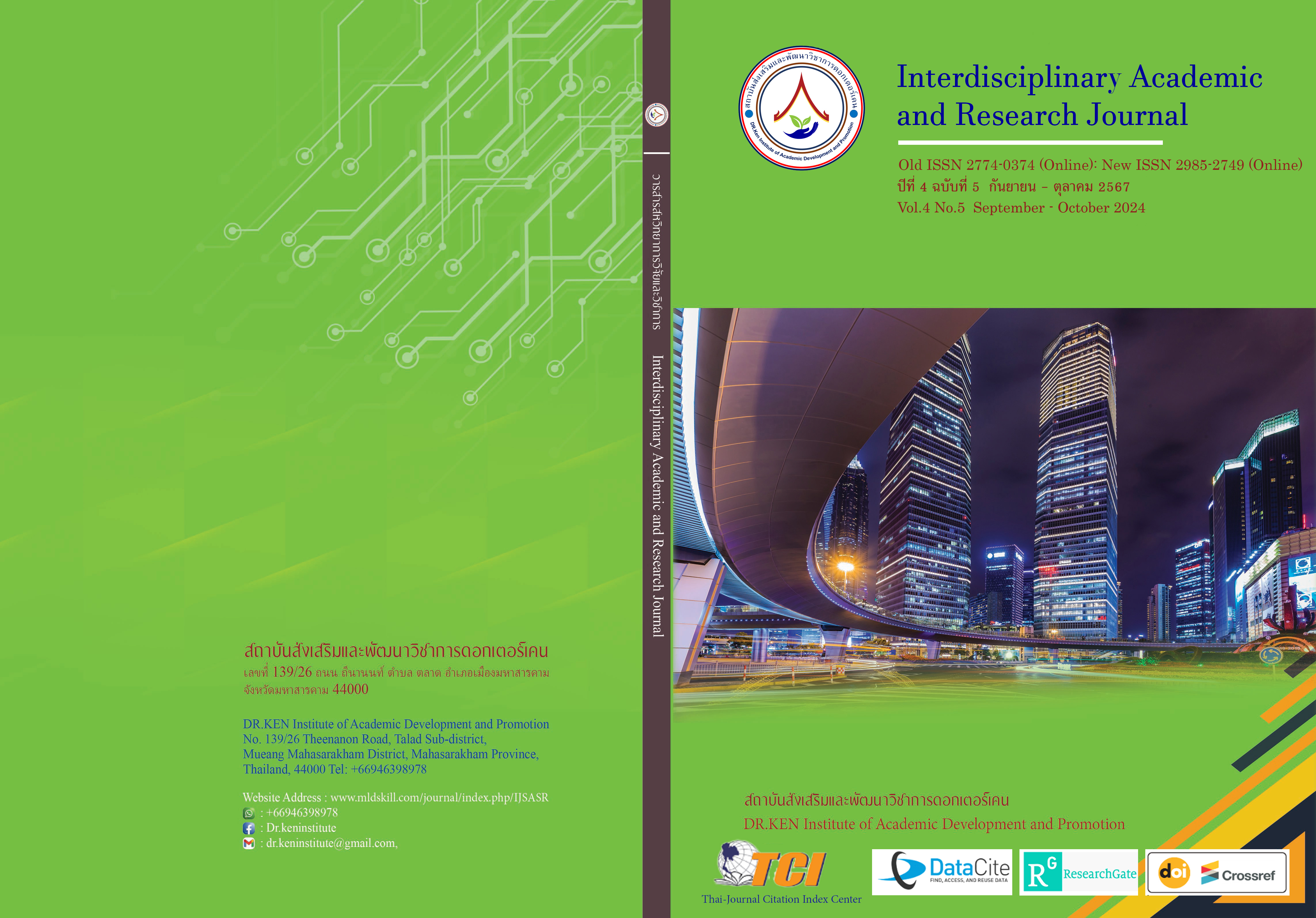Transformational Leadership of Educational Institution Administrators under the Office of the Vocational Education Commission Sa Kaeo Province
DOI:
https://doi.org/10.60027/iarj.2024.276069Keywords:
Leadership;, Educational Institution Administrators;, Office of Vocational Education CommissionAbstract
Background and Aims: Transformational leadership is essential because it inspires and motivates people to exceed their expectations, thereby encouraging innovation and personal growth. This leadership style promotes organizational change by fostering a shared vision and empowering team members to take ownership of their roles. The goals of this research are to: 1) investigate the level of transformational leadership among educational institution administrators. Sa Kaeo Province is administered by the Office of the Vocational Education Commission. 2) Compare the transformational leadership of educational institution administrators under the Office of the Vocational Education Commission, Sa Kaeo Province. Positions are classified based on their level of education and experience. 3) Investigate guidelines for fostering transformational leadership among school administrators. Sa Kaeo Province is administered by the Office of the Vocational Education Commission.
Methodology: This study used a sample of 86 school administrators and teachers. The sample size was calculated using Krejci and Morgan's table and divided randomly into groups. The research instrument was a 5-level rating scale questionnaire with a consistency index ranging from 0.80 to 1.00, and the overall reliability was 0.84. Data analysis statistics include frequency, percentage, mean, standard deviation, T-value, and F-value tests.
Results: The study found that: (1) transformational leadership of educational institution administrators under the Office of the Vocational Education Commission Sa Kaeo Province. Overall, it is of a high standard. When each aspect was examined, it was discovered that the aspect with the highest average was influenced by ideology, followed by stimulating the use of intelligence. In terms of individuality, the inspiration aspect has the lowest average. (2) A comparison of school administrators' perspectives on transformational leadership. Sa Kaeo Province's Office of the Vocational Education Commission classifies jobs based on position, education level, and experience. It was discovered that the overall and individual aspects were not different. (3) Guidelines for encouraging the development of Transformational leadership of educational institution administrators under the Office of the Vocational Education Commission include four aspects: 1) Ideology-based influence, 2) Inspiration, 3) Intelligence-based stimulation, and 4) Individuality consideration.
Conclusion: According to the research, transformational leadership is prevalent among Sa Kaeo Province administrators, with ideological influence being the strongest and inspiration being the lowest. There were no differences based on position, education, or experience, and development is centered on four key areas: influence, inspiration, intellectual stimulation, and individualized consideration.
References
เกศสุดา วรรณสินธ์. (2562). ภาวะผู้นำการเปลี่ยนแปลงของผู้บริหารสถานศึกษา สำนักงานเขตพื้นที่การศึกษามัธยมศึกษา เขต 27. วิทยานิพนธ์. มหาสารคาม: มหาวิทยาลัยราชภัฏมหาสารคาม.
จิตอิสรภาพ ใจอารีย์. (2564). การศึกษาภาวะผู้นำการเปลี่ยนแปลงของผู้บริหาร สถานศึกษาโรงเรียนในกลุ่มเครือข่ายดอยสันติคีรี สังกัดสำนักงานเขตพื้นที่การศึกษาประถมศึกษาเชียงราย เขต 3. การศึกษาค้นคว้าอิสระ. พะเยา: มหาวิทยาลัยพะเยา.
ธัญญามาศ แดงสีดา. (2565). ภาวะผู้นำการเปลี่ยนแปลงของผู้บริหารโรงเรียนขยายโอกาสทางการศึกษา สังกัดสำนักงานเขตพื้นที่การศึกษาประถมศึกษาระยอง เขต 1. วิทยานิพนธ์. กรุงเทพฯ: มหาวิทยาลัยเกริก.
นุสรา สิงห์พยัคเดช. (2560). การศึกษาภาวะผู้นำการเปลี่ยนแปลงเพื่อเข้าสู่ประชาคมอาเซียนของผู้บริหารสถานศึกษาสังกัดสำนักงานเขตพื้นที่การศึกษาประถมศึกษานครราชสีมา เขต 4. สิกขา วารสารศึกษาศาสตร์, 4(2), 9-10.
บุญชม ศรีสะอาด. (2545). การวิจัยเบื้องต้น. พิมพ์ครั้งที่ 7. กรุงเทพฯ : สุวีริยาสาส์น.
บุญชม ศรีสะอาด. (2553). การวิจัยเบื้องต้น. พิมพ์ครั้งที่ 8. กรุงเทพฯ : สุวีริยาสาส์น.
พิมพ์พร วงศ์อนุสิทธิ์. (2564). ภาวะผู้นำการเปลี่ยนแปลงของผู้บริหารสตรีที่ส่งผลต่อประสิทธิผลของโรงเรียนสังกัดสำนักงานเขตพื้นที่การศึกษาประถมศึกษาในจังหวัดนครพนม. วิทยานิพนธ์. สกลนคร:มหาวิทยาลัยราชภัฏสกลนคร.
ภิญญดา จันทรมณฑล. (2566). ภาวะผู้นำการเปลี่ยนแปลงของผู้บริหารสถานศึกษาตามการรับรู้ของครูสายสามัญระดับประถมศึกษา สังกัดสำนักงานคณะกรรมการส่งเสริมการศึกษาเอกชน กรุงเทพมหานคร. Journal of Modern Learning Development, 8(8), 168-169.
สำนักงานคณะกรรมการการศึกษาขั้นพื้นฐาน กระทรวงศึกษาธิการ. (2552). หลักสูตรแกนกลาง การศึกษาขั้นพื้นฐาน พุทธศักราช 2551. กรุงเทพฯ: ชุมนุมสหกรณ์การเกษตรแห่ง ประเทศไทย.
สำนักงานคณะกรรมการการศึกษาขั้นพื้นฐาน. (2553). พระราชบัญญัติการศึกษาแห่งชาติพ.ศ.2542 และที่แก้ไข เพิ่มเติม (ฉบับที่ 3) พ.ศ.2553. กรุงเทพฯ : สำนักนายกรัฐมนตรี.
อรวรรณ ภัทรดำเนินสุข. (2564). ภาวะผู้นําการเปลี่ยนแปลงของผู้บริหารกับแรงจูงใจในการปฏิบัติงานของครูในสถานศึกษาสังกัดสำนักงานเขตพื้นที่การศึกษาประถมศึกษาสมุทรสงคราม. นครปฐม: มหาวิทยาลัยศิลปากร.
Bass, B. M., & Avolio, B. J. (1990). Transformational Leadership Development: Manual for the Multifactor Leadership Questionnaire. Palo Alto, CA: Consulting Psychologists Press.
Jantzi, D., & Leithwood, K. (1996). Toward an Explanation of Variation in Teachers’ Perceptions of Transformational School Leadership. Educational Administration Quarterly, 32, 512-538. https://doi.org/10.1177/0013161X9603200404
Downloads
Published
How to Cite
Issue
Section
License
Copyright (c) 2024 Interdisciplinary Academic and Research Journal

This work is licensed under a Creative Commons Attribution-NonCommercial-NoDerivatives 4.0 International License.
Copyright on any article in the Interdisciplinary Academic and Research Journal is retained by the author(s) under the under the Creative Commons Attribution-NonCommercial-NoDerivatives 4.0 International License. Permission to use text, content, images, etc. of publication. Any user to read, download, copy, distribute, print, search, or link to the full texts of articles, crawl them for indexing, pass them as data to software, or use them for any other lawful purpose. But do not use it for commercial use or with the intent to benefit any business.
















.png)


